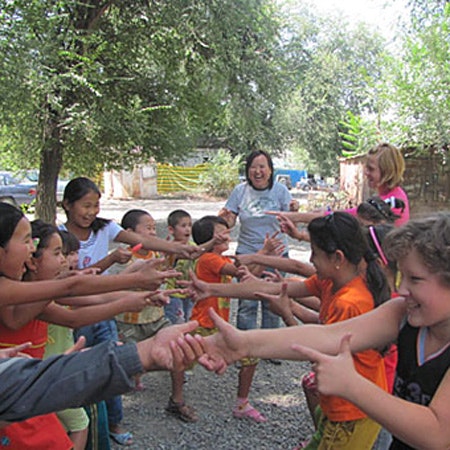Kyrgyz Social Work Fellows Bring It Home
By Zoe Brogden

Watching the violent clashes in the Kyrgyz city of Osh unfold from 4,000 miles away was difficult for Kyrgyz Open Society Social Work Fellowship scholars Bermet Ubaidillaeva and Janyl Moldalieva. The distance from the calm confines of Washington University in St Louis, Missouri, where the fellows are currently undertaking a master's in social work, was made all the more painful for Bermet, knowing that her five-year-old daughter resided in the chaos.
For Bermet and Janyl, the ability to create an impact in the aftermath of the unrest was made possible by their dedication to grassroots involvement and no small measure of enthusiasm. “Before the conflict in Osh, I had my plans to focus my Fundraiser Assignment on raising money for after-school programs in the Olivette Park area of St. Louis, but after the June 10 events, I approached my class instructor for permission to refocus on relief for conflict areas back in Kyrgyzstan,” explains Bermet.
Bermet and Janyl, along with three other social work students at the George Warren Brown School of Social Work in St. Louis, created the Kyrgyzstan Support Group (KSG), which organized a successful potluck event to raise awareness and funds. KSG was also represented by Janyl and another social work fellow, Salkynai Samatova (Columbia University), at the UN Youth Session on Understanding and Peace at the UN Headquarters in New York in August. Despite the quietness of the campus over the summer recess, they succeeded in collecting a considerable sum.
Applying the funds back to Kyrgyzstan was easier for the fellows, as Bermet is a former employee of a local organization in Osh named Family to Every Child. Family to Every Child was born after the 2009 withdrawal of EveryChild, a UK-based NGO. Bermet, with financial support for office infrastructure from EveryChild, aimed to keep the work of former EveryChild projects going through the establishment of Family to Every Child. The NGO has kept Bermet close to the current issues and needs in local social work. “All these transformations happened while I was here in the U.S. during the first year of my Social Work Fellowship, so I was keeping in touch with our Osh team as they started work,” said Bermet.
The NGO, with Bermet’s involvement from St. Louis, started the essential work of assisting in the aftermath of the unrest. “The workload for the NGO was doubled,” she explains. “Local government and state institutions completely relied on local NGOs like Family to Every Child. Projects such as the UNICEF-funded “Friendly Playgrounds for Kids” and SOS Children’s Villages Kyrgyzstan were implemented with the help of Bermet’s NGO and the Emergency Relief for Osh project.
As well as contributing to the development of an appropriate training program for social workers within a new project proposed by the Kyrgyz Ministry of Labor and Social Protection to provide help to families affected during the conflict, Bermet has been active in translating and interpreting from English into Kyrgyz, as those with such skills left the Osh area with the closure of several NGOs earlier this year.
“My main mission was to help children stay open minded and to respect other cultures and ethnicities” says Bermet. “I find projects on families and children very important as they provide children with a safe environment, which in turn contributes to their natural growth and development in a post-conflict period.”
After travelling back from Osh this summer, Bermet and Janyl have both positive and negative views on the reaction in the region after the unrest. Bermet sees the increased involvement of the Kyrgyz government in the area, as shown by the family assistance project, as well as a considerable reaction from the international donor community. Despite this, Bermet sees some of the work as slowing down due to unrealistic estimations of the human resources available.
Local languages are key here. “I became aware of some cases of psychologists invited to work with victims of violence and conducting their sessions in Russian: no one can speak or understand it,” says Bermet. “We all know that services need to be adequate and applicable to the population and we need to be very thoughtful in this respect as we have limited resources. I felt so discouraged when I heard these stories.”
With an intensive final year of the MSW program ahead of them, Bermet and Janyl have one eye firmly on the development of the NGO upon their return home. An idea in the pipeline is to develop a proposal for a code of ethics and accreditation for social welfare services for Kyrgyzstan, which takes best practice from the U.S. system. “Our ideas are just in the draft stages and we need to work on it,” says Bermet. “But we can do it here in U.S. where we have access to relevant sources and where we can also apply our study materials. We have all we need to develop a program and to take it with us.”
For Janyl, having ideas in the draft stage is a positive start. “Thinking about introducing change and brainstorming around this idea takes us one step further” she says. “Now it’s time for us to act and apply not only the relevant sources, but the best available evidence in the field.”
Until November 2021, Zoe Brogden was a senior team manager for the Open Society Scholarship Programs.